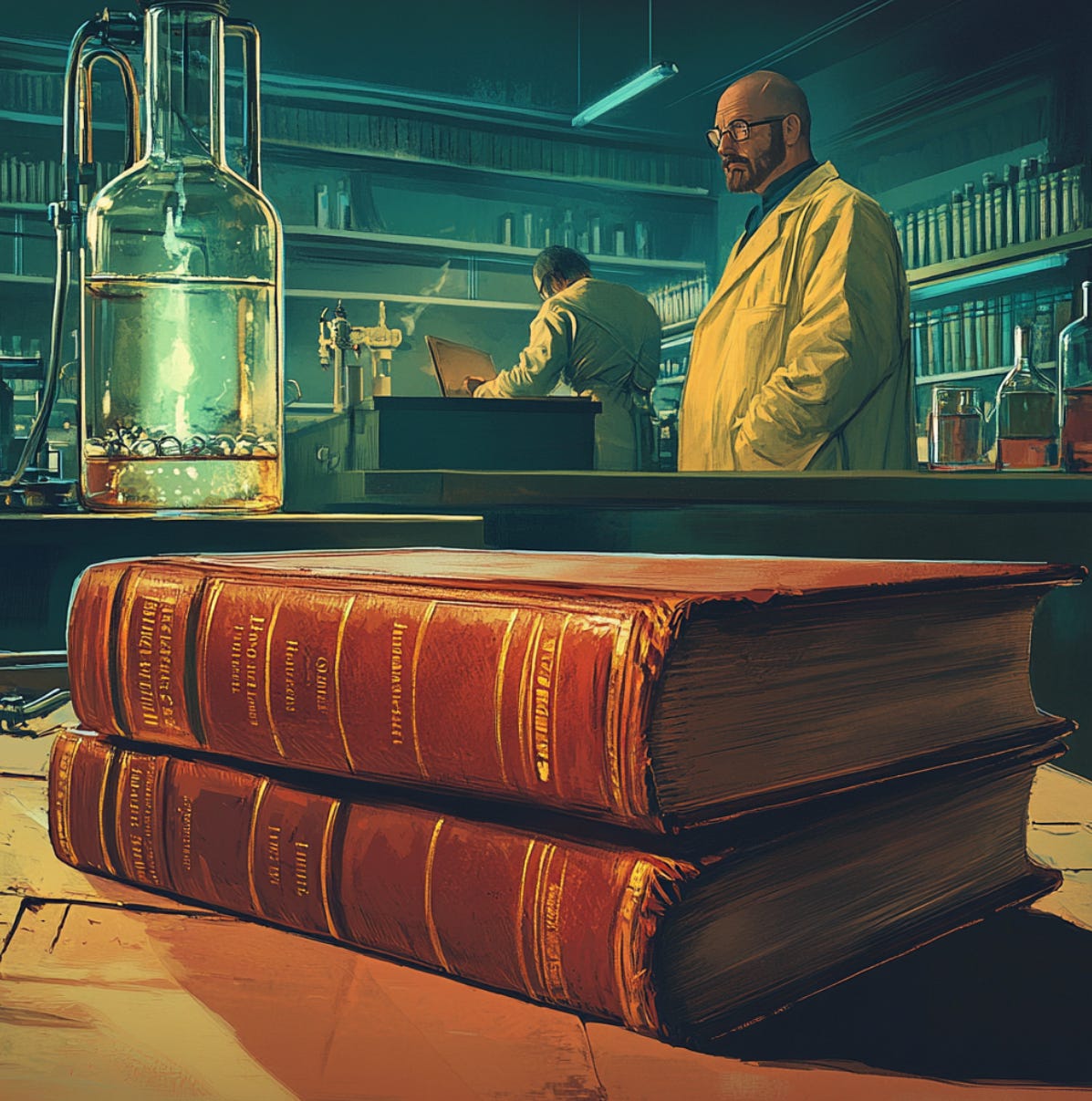The Transcendence of Virtue and Evil From Ancient to Modern Times
By Zuleika Wood
This semester included reading some of the most influential works of literature, including The Iliad and The Odyssey by Homer, The Republic by Plato, and The Bhagavad Gita by Maharishi. These texts explore different worldviews, like Homer’s emphasis on honor and heroism, Plato’s philosophical vision of justice and truth, and the Eastern focus on doing your duty in the hindu way. At the same time, I’ve been watching Breaking Bad, which is a crime drama about Walter White, a high school chemistry teacher who turned into a methamphetamine manufacturer mastermind after a lung cancer diagnosis. Partnering with his former student Jesse Pinkman, Walter enters the drug trade to secure his family’s future, but his descent into the criminal world transforms him into an unrepentant kingpin. As his alter ego “Heisenberg,” Walter’s actions spiral out of control, leading to betrayal, violence, and devastating consequences for his family and associates. The show explores themes like morality, ambition, and the consequences of choice. By comparing Breaking Bad to the characters in the books we read in class, we learn that ordinary people, when placed in extraordinary circumstances, can be driven to make morally ambiguous or even catastrophic choices, revealing the duality of human nature and the capacity for transformation, both redemptive and destructive. My essay examines how characters in Breaking Bad compare to the characters in these timeless texts. By analyzing Walter’s moral dilemmas and the philosophical tensions in the show, I aim to explore how modern and ancient stories both reveal universal truths about human nature, justice, and the struggles between virtue and vice.
Though separated by almost three thousand years, Walter White from Breaking Bad and Achilles from The Iliad both experience complex journeys of pride, ambition, and moral downfall. Both characters are driven by an overwhelming desire for recognition and power, though their motives differ. Achilles seeks eternal glory as a warrior, especially after his rival Hector kills Achilles’s best friend, while Walter craves control and wealth. Both men start with seemingly justifiable grievances—Achilles feels dishonored when Agamemnon takes Briseis, who was Achilles’s prize, and Walter feels robbed of his potential after a cancer diagnosis and financial struggles which lead everyone to pity him—but their reactions spiral into destructive paths. Their pride becomes their greatest flaw, driving them to actions that harm those closest to them. Achilles’ refusal to fight leads to the death of his best friend, Patroclus, while Walter’s ego-driven decisions alienate his family and bring ruin to those around him. What makes this comparison even richer is how both characters attempt to justify their choices. Achilles insists his wrath is righteous, tied to his honor as a hero. Similarly, Walter repeatedly frames his actions as being for his family, even when it’s clear his motivations are selfish. He even admits that he was making drugs for himself this whole time in one of the last episodes. Achilles faces the devastation of Troy and his own inevitable death, while Walter died feeling he had accomplished what he wanted most, destroying his enemies. Together, these characters reflect the timeless dangers of unchecked ambition and the ways pride can distort a man’s sense of justice and virtue.
Building on the theme of honor and its complexities, Mike Ehrmantraut from Breaking Bad and Hector from The Iliad provide two distinct yet overlapping examples of how duty shapes a man’s life and legacy. Hector, the noble defender of Troy, fights not for personal glory but for the survival of his family and city, embodying an ideal of unwavering honor. Mike, though immersed in the criminal world, operates according to a similarly strict personal code, driven by his commitment to provide for his granddaughter and to repay his former partners. Both men shoulder immense burdens for the sake of others, sacrificing their own safety and ultimately their lives. Despite their shared sense of duty, their approaches diverge significantly. Hector is idealistic and principled, refusing to abandon his responsibilities even when he knows his stand against Achilles will lead to his death. In contrast, Mike is a pragmatist who operates in shades of grey, willing to compromise traditional moral boundaries to achieve his goals. Yet, even in his calculated choices, Mike maintains a core of loyalty and integrity that mirrors Hector’s dedication. Both men’s fates reflect the cost of living by their respective codes. Hector’s nobility leads to his tragic death at the hands of Achilles, while Mike’s loyalty to his employer and his family ultimately results in betrayal and his murder. Together, they illustrate how honor, whether idealistic or pragmatic, demands sacrifices and carries consequences that transcend time and culture.
Skyler White from Breaking Bad and Penelope from The Odyssey share notable similarities as women navigating loyalty, family, and survival in complex, male-dominated worlds. Both are wives whose husbands’ choices place them in precarious positions, forcing them to balance their own lives as well as the pressures of their circumstances. Penelope, left to manage Ithaca during Odysseus’ long absence, faces relentless suitors who demand her hand in marriage, threatening her household and her son, Telemachus. She uses intelligence and patience to maintain her loyalty to Odysseus, weaving and unweaving a shroud as a clever plot to delay remarriage. Similarly, Skyler, married to Walter White, must navigate the dangerous fallout of her husband’s descent into crime. Initially unaware of Walter’s actions, she later becomes complicit, managing the family’s finances and laundering his drug money to protect their family. Both women embody resilience and resourcefulness in the face of overwhelming challenges. Penelope’s cunning ensures her household’s survival, while Skyler’s quick thinking allows her to shield her children and herself from the dangers of Walter’s choices. However, unlike Penelope, Skyler’s loyalty to Walter is fractured as his actions grow darker. She ultimately prioritizes her children’s safety, even if it means opposing her husband. This contrast highlights an evolution in how modern narratives portray women: Skyler’s moral conflict and eventual defiance suggest a more complex dynamic, while Penelope remains steadfast in her devotion. Together, these characters illustrate the timeless struggle of women to protect their families while grappling with the terrible things placed upon them by their husbands’ decisions.
Hank Schrader from Breaking Bad and Plato’s philosopher-king from The Republic share similarities in their dedication to truth and justice, but their differences highlight the tension between idealized leadership and the flawed realities of human nature. Plato’s philosopher-king is the embodiment of wisdom, ruling with reason and a deep understanding of the Forms, particularly the Form of Justice. This ruler is detached from personal desires, leading selflessly for the greater good. Hank, as a DEA agent, is similarly committed to justice, driven by an unshakable belief in the importance of law and order. His determination to dismantle criminal networks, including the empire built by Walter White, reflects a profound sense of duty to society. However, where the philosopher-king approaches justice with mostly sensible rationality, Hank operates in a world of moral ambiguity, his own bias, and emotional investment. His pursuit of Walter becomes deeply personal, fueled by anger and betrayal, which clouds his judgment at times. Unlike the philosopher-king, who rules from a position of enlightened understanding, Hank is limited by the constraints of his emotions and the imperfect systems of law enforcement. Despite these differences, both figures demonstrate the sacrifices required of those who uphold justice. The philosopher-king renounces personal pleasures for the good of the state, while Hank risks and ultimately loses his life to protect his principles. Together, they reflect different facets of the struggle for justice: the idealism of philosophy versus the gritty reality of human imperfection.
Jesse Pinkman from Breaking Bad and Arjuna from the Bhagavad Gita share noticeable similarities in their moral struggles, inner conflicts, and ultimate quest for purpose amidst chaotic circumstances. Both characters are thrust into environments where they must navigate the consequences of violence and moral ambiguity, grappling with the tension between their actions and their ethical beliefs. Arjuna, a warrior on the battlefield of Kurukshetra, is paralyzed by doubt and guilt, questioning whether fighting in the war and killing his relatives is truly just. Similarly, Jesse is plagued by guilt over his involvement in Walter White’s drug empire, particularly the violence and suffering his actions cause to others, including innocent people. Both characters also face a form of guidance that seeks to realign their moral compass. Arjuna receives counsel from Krishna, who urges him to embrace his dharma, or duty, as a warrior, and to act selflessly for the greater cosmic order. Jesse, on the other hand, lacks a benevolent guide like Krishna; instead, he is manipulated by Walter and must navigate his crisis largely on his own. However, like Arjuna, Jesse ultimately seeks a path that aligns with his conscience, as he rejects Walter’s control and seeks redemption for his past actions. While Arjuna’s journey is rooted in spiritual wisdom and the pursuit of selfless duty, Jesse’s journey through the meth-making world reflects the modern struggle of reclaiming morality in a corrupt world. Both characters remind us of the profound weight of ethical choices and the struggle to align action with integrity.
The comparisons between the characters of Breaking Bad and figures from classic literature like Hector, Achilles, Arjuna,Penelope, and the guardians of Plato’s Republic reveal the timeless nature of human struggles with morality, duty, and identity. These parallels demonstrate that the core dilemmas faced by people—whether in ancient epics or modern dramas—are universal and enduring. By exploring these connections, we can see how ancient stories of honor, ambition, and sacrifice are echoed in contemporary narratives, highlighting the continuity of human nature and the ethical challenges that define it. These comparisons are also relevant because they help us bridge the gap between modern and ancient storytelling. They show how themes such as the pursuit of justice, the cost of pride, and the conflict between personal desires and societal responsibilities are reinterpreted in different cultural and historical contexts. Walter White’s descent into moral corruption, Hank Schrader’s sense of duty, and Jesse Pinkman’s quest for redemption all find reflections in characters like Achilles, Hector, and Arjuna, proving that while the settings and details may change, the essence of these struggles remains the same. Ultimately, these comparisons remind us of the importance of examining our own lives through the lens of these stories to live a truly virtuous life.




